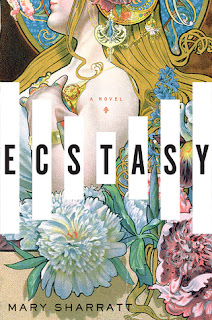Ecstasy by Mary Sharratt
Alma Maria Schindler (1879-1964) was a Viennese-born composer. She was musically active from her early years, only to have it suppressed by a famous composer and one of the leading conductors of the time, and later her husband Gustav Mahler. She composed at least 17 songs, which are actively performed and recorded. According to her diary, she composed over 100 songs, but it is unknown if maybe they were destroyed during WWII, when she was fleeing Austria for US.
1899, Vienna, Austria. This story starts with Alma at the age of 19, when she dreams about composing an opera – something no woman had ever done.
Her stepfather, Carl Moll, was the Secession’s vice president. The Vienna Secession art movement was the best-known and included Gustav Klimt, Max Klinger, and Fernand Khnopff. This was her stepfather’s circle, artists of unique style, who broke from tradition. And this is how she got to know Gustav Klimt, 37 at the time, who becomes her first love.
When Alma’s stepfather refuses to pay for her to study at the Vienna Conservatory, it fuels even a bigger fire inside her to succeed. Her lessons continue with Alexander von Zemlinsky, a talented composer and conductor.
Then, she meets Gustav Mahler and everything changes. She dreams of them composing side by side like Robert and Clara Schumann. But he couldn’t be clearer that such thing will never happen as he needs her as his wife and not his colleague. She is torn, but his genius touches her to the core.
“…talent in itself was not enough. One must be brave enough to seize one’s gift and go to battle for it. (…) Was she courageous enough…”?
She suspects that “she would end up serving a man anyway.” Why not “to serve genius instead of mediocrity?” Is she to become “A mere footnote to his brilliance?”
Gustav accepts a position in NYC, where Alma meets Natalie Curtis. “She’s an ethnomusicologist and lived for years with the Hopi Indians in Arizona. She’s written two books on Indian culture, and she’s also a composer.” Alma is flabbergasted. “How truly democratic America is. (…) … never had Alma imagined that a woman could be this free, this intrepid, this bold. Only in America.”
To Alma’s another surprise, “This being America, the president of the New York Philharmonic was a woman.”
The author vividly portrays a woman who was musically talented, but was forced to choose. She couldn’t be a wife and pursue her career. It was her duty as a wife to support her husband and his career. This only resulted in her artistic soul dying inside her and being depressed.
@FB/BestHistoricalFiction
1899, Vienna, Austria. This story starts with Alma at the age of 19, when she dreams about composing an opera – something no woman had ever done.
Her stepfather, Carl Moll, was the Secession’s vice president. The Vienna Secession art movement was the best-known and included Gustav Klimt, Max Klinger, and Fernand Khnopff. This was her stepfather’s circle, artists of unique style, who broke from tradition. And this is how she got to know Gustav Klimt, 37 at the time, who becomes her first love.
When Alma’s stepfather refuses to pay for her to study at the Vienna Conservatory, it fuels even a bigger fire inside her to succeed. Her lessons continue with Alexander von Zemlinsky, a talented composer and conductor.
Then, she meets Gustav Mahler and everything changes. She dreams of them composing side by side like Robert and Clara Schumann. But he couldn’t be clearer that such thing will never happen as he needs her as his wife and not his colleague. She is torn, but his genius touches her to the core.
“…talent in itself was not enough. One must be brave enough to seize one’s gift and go to battle for it. (…) Was she courageous enough…”?
She suspects that “she would end up serving a man anyway.” Why not “to serve genius instead of mediocrity?” Is she to become “A mere footnote to his brilliance?”
Gustav accepts a position in NYC, where Alma meets Natalie Curtis. “She’s an ethnomusicologist and lived for years with the Hopi Indians in Arizona. She’s written two books on Indian culture, and she’s also a composer.” Alma is flabbergasted. “How truly democratic America is. (…) … never had Alma imagined that a woman could be this free, this intrepid, this bold. Only in America.”
To Alma’s another surprise, “This being America, the president of the New York Philharmonic was a woman.”
The author vividly portrays a woman who was musically talented, but was forced to choose. She couldn’t be a wife and pursue her career. It was her duty as a wife to support her husband and his career. This only resulted in her artistic soul dying inside her and being depressed.
@FB/BestHistoricalFiction

Comments
Post a Comment